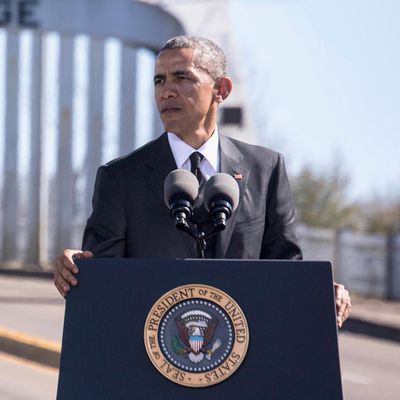
President Obama’s speech to commemorate the 50th anniversary of the March on Selma provided a stunning visual tableau that communicated a powerful idea — the unimaginable contrast in status between the denial of basic rights of citizenship five decades ago and the existence of a black president today — that could be transmitted through a photograph alone. But Obama’s speech itself did not play a merely ceremonial role, nor was its purpose confined to commemoration and uplift. The president was deeply engaged in an intellectual debate about identity and patriotism.
The unspoken but clear subject of the address was the suggestion raised recently by Rudy Giuliani, and endorsed or conspicuously not-repudiated by several others, that Obama does not love the United States of America. And that suspicion, in turn, is rooted in race. Racial oppression has historically complicated the relationship of black Americans to their own country, in the way that abuse complicates even the deepest forms of love. There is a tradition of black anger that manifests as rejection of patriotism, with which Obama is deeply familiar, since his former pastor preached it. Even at the cognitive level, white Americans have a harder time associating African-Americans with love of country.
Obama pointed out that the marchers at Selma also saw their patriotism questioned. But, Obama argued, they were not merely patriots; their actions represented the apotheosis of patriotism: “What greater expression of faith in the American experiment than this; what greater form of patriotism is there; than the belief that America is not yet finished, that we are strong enough to be self-critical, that each successive generation can look upon our imperfections and decide that it is in our power to remake this nation to more closely align with our highest ideals?”
The central theme of Obama’s speech was to place black history at the center of the American idea. (“Selma is not some outlier in the American experience. That’s why it’s not a museum or static monument to behold from a distance. It is instead the manifestation of a creed written into our founding documents.”) The president hammered the theme continuously, citing the slaves who built the White House, abolitionists, and civil-rights demonstrators. American history, in Obama’s telling, is the ongoing and inevitably successful struggle to close the gap between its founding ideals and its realities. Obama extended this to such disparate things as the struggle for equality for women and gays, and the striving of immigrants, which have inspired democrats across the globe. Black America’s struggle for freedom represents, in Obama’s telling, the apotheosis of Americanism.
By embedding blackness within American patriotism, Obama also argued against an important tradition on the left. Ta-Nehisi Coates, an important intellectual whose work Obama (to his credit) takes very seriously, has presented racism as the essence of the American story. “White supremacy does not contradict American democracy — it birthed it, nurtured it, and financed it,” he has written. White supremacy is so central to the American story that, in his thinking, it is immutable: “I view white supremacy as one of the central organizing forces in American life, whose vestiges and practices afflicted black people in the past, continue to afflict black people today, and will likely afflict black people until this country passes into the dust.”
Even while acknowledging racism’s continuing existence, Obama cast it as a waning force. “We do a disservice to the cause of justice by intimating that bias and discrimination are immutable, or that racial division is inherent to America,” he argued. The contrast here is frontal. One analysis sees the central organizing force in American life as white supremacy; the other sees it as the struggle against it. One dismisses progress (“You don’t stick a knife in a man’s back nine inches,” said Malcolm X, “and then pull it out six inches and say you’re making progress”). The other celebrates it (“To deny this progress — our progress — would be to rob us of our own agency; our responsibility to do what we can to make America better”).
It goes without saying that the mere fact that Obama disagrees with Coates (or, for that matter, Giuliani) does not make them wrong. The president is a participant in debates, not an arbiter of them. This is the striking thing about the speech at Selma — for all its inspiration and historical grandeur, this was Obama not ratifying a consensus but making an argument.






























